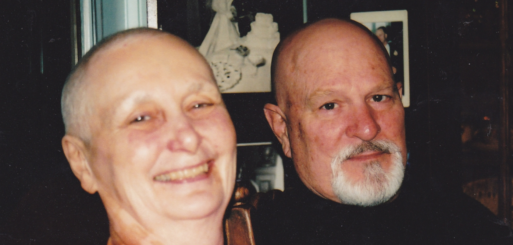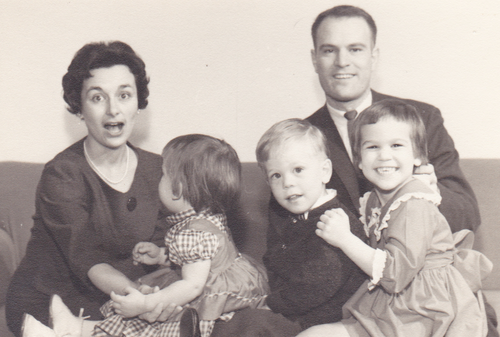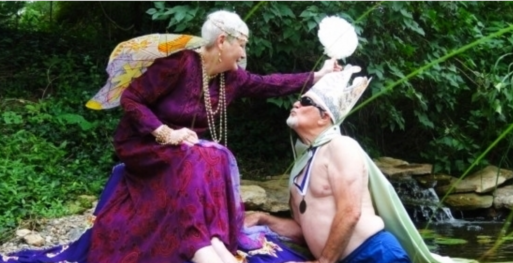
Mary Jo and George Steger
Credit: Ben Steger
On the surface, “Stage Four: A Love Story” is a touching documentary about a Midwestern couple in their sixties whose quiet lives are upended by a cancer diagnosis. The story begins with Mary Jo Steger sitting in her living room talking to her son Tim, calmly explaining that she has metastatic breast cancer. During that conversation, it becomes obvious to the viewer that Mary Jo’s acceptance of her diagnosis and its implications isn’t shared by her family or her spouse. From the beginning, it seems that this underlying conflict will be the central theme of the film.
And to some extent, it is. There are certainly many conversations interspersed throughout the film during which George and Tim and the couple’s other children encourage Mary Jo to have a “better” attitude and “fight” the disease. But “Stage Four: A Love Story” also takes some refreshing and somewhat surprising turns as Steger stops the current narrative and, using a series of still photos and home movies, takes us back in time. Narrated by Mary Jo and George, this retrospective of their 50-year marriage forms a compelling and intimate backdrop to the couple’s 6-year cancer journey — a journey that in many ways mirrors their voyage from young love to disillusionment and back again.
Babies Having Babies
Mary Jo and George married on December 28, 1957, when she was just 20 and he was 22. They were a beautiful young couple, caught up in the breathtaking exhilaration of young love. But by both of their admissions, they were completely unprepared for the realities of married life. As Mary Jo says, “there was no growing up time.” In what seemed like moments, she went from being a dependent in her parents home to being a wife and mother. Meanwhile, George, who never knew his own father, rigorously pursued the role of “the man of the house.”

The Steger Family: Circa early 60s
Credit: stagefouralovestory.com
Mary Jo is amazingly frank about those early years. Despite the smiling faces in the photos of the young military family traveling around the world, she admits to being miserably unhappy — overlooked by her husband and stifled by her “wifely” role. Speaking through the lens of time and space, George admits that he objectified his wife, refusing for many years to view her as the equal she certainly was. Mary Jo confesses that if it weren’t for the children, she would have left her husband many years ago.
But despite their difficulties, the couple persevered. They worked through hard times with compromise and conversations — conversations that Mary Jo insisted upon no matter how much George rebelled. Slowly, over many years, George began to appreciate the wisdom behind his wife’s calm facade. Life was good, albeit imperfect, as they settled comfortably into their twilight years.
And then tragedy struck.
Finding Balance
The remainder of “Stage Four: A Love Story” chronicles the lives of Mary Jo and her family as they learn to live with her disease. At first reluctant to try chemotherapy, Mary Jo acquiesces to the family’s wishes, and, much to her surprise, she responds remarkably well. She enjoys several years of quality time, chronicled beautifully on film by her son Ben, before her cancer returns. And even then, she beats the odds, turning her surgeon’s predicted two-week survival time into several more good years.
The most remarkable thing about “Stage Four: A Love Story” is that at no time do we see a suffering woman trudging hopelessly to her ultimate demise. Quite the contrary, in fact. Mary Jo is the quintessential heroine. Despite increasing frailty and the knowledge of certain death, she learns to enjoy life one moment at a time. Perhaps even more amazingly, she takes her husband, whose sadness at losing his life partner is a palpable presence throughout the film, along for the ride.

Mary Jo became animated and playful towards the end of her life, dressing up like a princess with George as her “frog prince”
Credit: stagefouralovestory.com
“Stage Four: A Love Story” is a wonderful film that exceeded my expectations time and time again. Because of what I do at SevenPonds, I read a lot of books and watch a lot of movies about death and dying — quite a few of them about cancer, since it claims so many lives. And many of those have been wonderful, uplifting tributes to courage and resilience and the incredible power of love. But very few captured my heart quite like this film.
No matter where you are in your life, “Stage Four: A Love Story” is a must see.
Note: “Stage Four: A Love Story” was available for limited viewing from 2014 – 2016. Now, Ben Steger has released the film to the public. You may watch it on Vimeo here.

 “Stage Four: A Love Story” by Benjamin Steger
“Stage Four: A Love Story” by Benjamin Steger


 First the Wealth Gap, Now the U.S. Has a Growing Health Gap
First the Wealth Gap, Now the U.S. Has a Growing Health Gap
 How to Comfort A Dying Loved One
How to Comfort A Dying Loved One
 Our Annual Seven Holiday Gifts for Someone Who Is Grieving, 2024 Edition
Our Annual Seven Holiday Gifts for Someone Who Is Grieving, 2024 Edition














